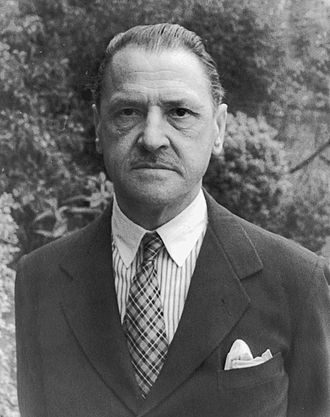Up at the Villa
Book Details
| Title: | Up at the Villa | ||||||||
| Author: |
| ||||||||
| Published: | 1941 | ||||||||
| Publisher: | Heinemann | ||||||||
| Tags: | fiction, romance, war, Film Adaptation | ||||||||
| Description: | Novella, or, to use Maugham’s preferred term, novelette. Romance and intrigue in the hills outside Florence during the runup to the Second World War, featuring a young and beautiful widow. “It was easy and amusing to write,” Maugham commented in a preface to his 1953 Selected Novels. “I never attached any great importance to it and it has surprised me to learn that in the Latin countries and in the Near East it has been one of the most popular of my books. I ask no more of the reader than that he should find in it an hour’s diversion.” [Suggest a different description.] |
||||||||
| Downloads: | 441 | ||||||||
| Pages: | 55  |
Author Bio for Maugham, W. Somerset (William Somerset)

Maugham's masterpiece is generally agreed to be Of Human Bondage, a semiautobiographical novel that deals with the life of the main character Philip Carey, who, like Maugham, was orphaned, and brought up by his pious uncle. Philip's clubfoot causes him endless self-consciousness and embarrassment, echoing Maugham's struggles with his stutter and, as his biographer Ted Morgan notes, his homosexuality.
Two of his later novels were based on historical people: The Moon and Sixpence is about the life of Paul Gauguin; and Cakes and Ale contains what were taken as thinly veiled and unflattering characterizations of the authors Thomas Hardy (who had died two years previously) and Hugh Walpole. Maugham himself denied any intention of doing this in a long letter to Walpole: "I certainly never intended Alroy Kear to be a portrait of you. He is made up of a dozen people and the greater part of him is myself"—yet in an introduction written for the 1950 Modern Library edition of the work, he plainly states that Walpole was the inspiration for Kear (while denying that Thomas Hardy was the inspiration for the novelist Driffield). Maugham's last major novel, The Razor's Edge (1944), was a departure for him in many ways. While much of the novel takes place in Europe, its main characters are American, not British. The protagonist is a disillusioned veteran of the First World War who abandons his wealthy friends and lifestyle, traveling to India seeking enlightenment. The story's themes of Eastern mysticism and war-weariness struck a chord with readers during the Second World War. It was adapted into a major motion picture released in 1946, then again in 1984 starring Bill Murray.
Among his short stories, some of the most memorable are those dealing with the lives of Western, mostly British, colonists in the Far East. They typically express the emotional toll the colonists bear by their isolation. "Rain", "Footprints in the Jungle", and "The Outstation" are considered especially notable. "Rain", in particular, which charts the moral disintegration of a missionary attempting to convert prostitute Sadie Thompson, has kept its reputation. It has been adapted as a play and as several films. His The Magician (1908) is based on British occultist Aleister Crowley.
Maugham was one of the most significant travel writers of the inter-war years, and can be compared with contemporaries such as Evelyn Waugh and Freya Stark. His best efforts in this line include The Gentleman in the Parlour, dealing with a journey through Burma, Siam, Cambodia and Vietnam, and On a Chinese Screen, a series of very brief vignettes that might have been sketches for stories left unwritten.--Wikipedia.
Available Formats
No book directory. Upload has not been completed.This book is in the public domain in Canada, and is made available to you DRM-free. You may do whatever you like with this book, but mostly we hope you will read it.
Here at FadedPage and our companion site Distributed Proofreaders Canada, we pride ourselves on producing the best ebooks you can find. Please tell us about any errors you have found in this book, or in the information on this page about this book.